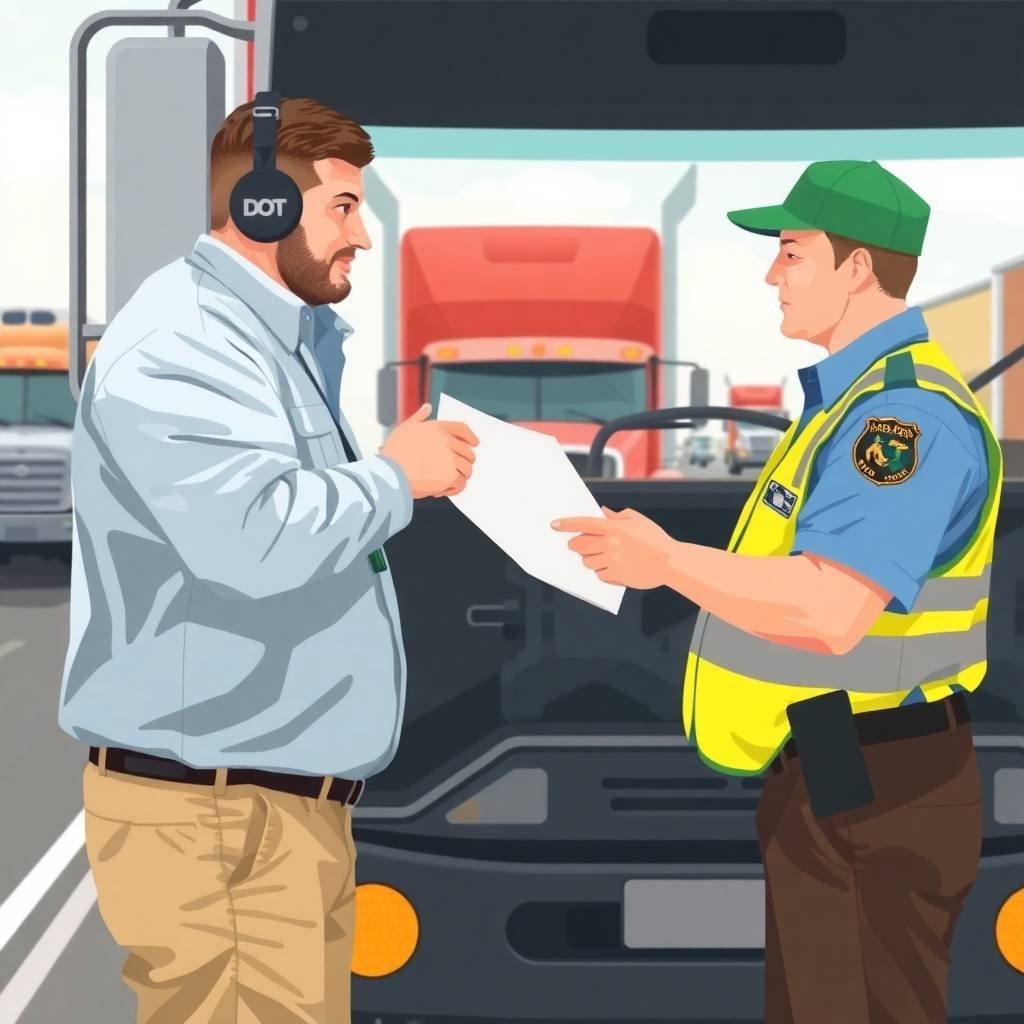1. How to Correct FMCSA Violations by Identifying the Root Cause
Understanding how to correct FMCSA violations begins with identifying the root causes behind the infractions. Whether it’s a failed DOT inspection, non-compliant driver files, or missed drug testing requirements, corrective action starts with insight — not just reaction.
The Federal Motor Carrier Safety Administration (FMCSA) maintains strict compliance guidelines. When violations occur, they not only increase your CSA scores but may also lead to audits, fines, or even shutdowns. That’s why it’s critical to dive deep into why a violation happened rather than just treating the symptoms.
Start With the FMCSA Safety Measurement System (SMS)
The FMCSA Safety Measurement System (SMS) provides detailed insights into your compliance status. It helps pinpoint violations in categories like Unsafe Driving, Hours of Service, and Vehicle Maintenance. Knowing where you stand helps you develop strategies for how to correct FMCSA violations with targeted action.
Assess Driver Qualification Files
A common root cause of compliance issues lies in incomplete or outdated Driver Qualification (DQ) files. Missing documents or expired medical certificates can trigger violations during audits. Our DQ file setup and monitoring services ensure every document is accounted for, reducing risk.
Review Drug and Alcohol Testing Programs
DOT-regulated carriers must maintain robust drug and alcohol testing compliance. Violations often stem from missing pre-employment or random tests. Our drug and alcohol testing management solutions can help maintain ongoing compliance. For a detailed breakdown of testing requirements, explore our guides on pre-employment DOT drug testing and random DOT testing requirements.
Utilize DOT Compliance Checklists
Another way to uncover root causes is through structured reviews like our DOT compliance checklist. Owner-operators can also benefit from our tailored compliance checklist for owner-operators.
Prepare Proactively for DOT Audits
If you’re unsure about your current status, schedule a DOT audit preparation session. We’ll walk you through past violations, corrective actions, and policies to prevent future infractions. Don’t wait—book a 30-minute consultation today.
Eliminate Recurring Violations With Compliance Services
Knowing how to correct FMCSA violations means having the right tools and support in place. Explore additional resources and services such as:
- BOC-3 Process Agent Compliance
- UCR Filing Assistance
- IFTA & IRP Support
- FMCSA Compliance Services for Owner-Operators
More Valuable Information
To stay informed, visit Truckers Compliance Hub regularly for updates. Key reads include:
Additionally, learn more about industry guidelines on the official FMCSA website and U.S. Department of Transportation.
By proactively identifying the root causes behind violations, you’ll have a clear plan for how to correct FMCSA violations and maintain compliance.

2. Create a Customized Compliance Action Plan
Building a strong foundation for DOT and FMCSA compliance begins with one crucial step: creating a customized compliance action plan. Whether you’re an owner-operator or a fleet manager, understanding how to correct FMCSA violations is essential for safeguarding your business, avoiding penalties, and operating with confidence.
Why a Tailored Approach Matters
Every carrier has unique operations, risks, and compliance needs. A one-size-fits-all checklist won’t cut it. To truly grasp how to correct FMCSA violations, you need a strategic plan customized to your safety history, audit risk, and fleet practices. Our DOT compliance checklist for owner-operators is a great starting point, while larger carriers can benefit from our full DOT compliance checklist.
Identify and Prioritize Violations
Step one in your plan is identifying current violations. Use the FMCSA Safety Measurement System (SMS) to evaluate your standing. This tool breaks down your compliance history and highlights which areas need immediate attention. Whether it’s DQ file violations or gaps in your drug and alcohol testing compliance, your action plan should target root causes first.
Update Driver Qualification Files
Many carriers overlook how critical compliant Driver Qualification Files are in preventing violations. Our DQ file setup and monitoring services help ensure everything from MVRs to medical cards is complete and current, which is key when learning how to correct FMCSA violations proactively.
Strengthen Drug & Alcohol Testing Programs
Your plan must include robust procedures for DOT drug and alcohol testing. This includes adhering to pre-employment testing requirements and random testing protocols. We offer full drug and alcohol testing management to keep your program audit-ready.
Prepare for Future DOT Audits
Knowing how to correct FMCSA violations also means being ready for upcoming audits. Our DOT audit preparation services and the detailed 2025 audit readiness guide equip you with tools and insights to stay ahead of enforcement.
Filing and Registration Assistance
Don’t overlook the importance of UCR, IFTA, and BOC-3 filings. Let us assist with:
These services are crucial to your action plan and long-term compliance.
Schedule Your Consultation Today
To begin building your customized compliance plan and fully understand how to correct FMCSA violations, schedule your 30-minute consultation today. We’ll walk you through every step and help tailor your approach for sustainable results.
More Resources for Compliance Success
Stay updated by visiting the Truckers Compliance Hub blog and explore key resources like:
- FMCSA Clearinghouse Compliance
- FMCSA Compliance Services for Owner-Operators
- How to Avoid Common Compliance Mistakes
- FMCSA Compliance Help for Trucking Companies
You can also find official guidance at the FMCSA website and the U.S. Department of Transportation.

3. Reinforce Driver Training and Safety Protocols
When it comes to how to correct FMCSA violations, one of the most effective strategies is reinforcing driver training and safety protocols. While filing paperwork and updating records is critical, true FMCSA compliance is achieved through proactive education and behavioral change behind the wheel.
The Role of Training in Compliance
Comprehensive driver training is essential in reducing risk, avoiding violations, and improving CSA scores. According to the Federal Motor Carrier Safety Administration, most violations stem from preventable issues such as hours-of-service (HOS) errors, unsafe driving, and poorly maintained vehicles—all of which can be mitigated with proper instruction.
To support your training initiatives, refer to our in-depth resources like the FMCSA Safety Measurement System (SMS) 2025 guide and our FMCSA compliance mistakes to avoid post.
Address the Root Cause of Violations
To understand how to correct FMCSA violations, companies must dig into the root cause of repeat issues. Are drivers failing to update logs properly? Is there a lack of knowledge around drug and alcohol testing compliance or driver qualification file requirements? These answers help customize a compliance plan.
Consider using our DQ File Setup and Monitoring service and drug and alcohol testing management to reinforce back-end compliance in tandem with training.
Use a Compliance Checklist
Implementing a clear training schedule is easier when paired with a structured checklist. Our DOT Compliance Checklist and checklist for owner-operators help ensure no aspect of compliance is overlooked.
Understanding how to correct FMCSA violations also involves training on pre-employment DOT drug testing, random testing requirements, and the Clearinghouse rules.
Prepare for DOT Audits Through Practice
Training isn’t just about daily driving. Drivers and managers must also be ready for audits. Our DOT Audit Preparation service and the 2025 Audit Preparation Guide provide practical tools and scenarios to simulate real audit conditions.
This process is integral in understanding how to correct FMCSA violations before they lead to penalties or shutdowns.
Schedule Your Custom Training Consultation
Need help developing a training plan that aligns with your compliance goals? Schedule your 30-minute consultation today and let our compliance experts guide you through the process.
We’ll help you reinforce safety and equip your team with the tools necessary to operate safely and within regulation.
More Resources for FMCSA Success
For regular updates and more insights on how to correct FMCSA violations, explore our blog at Truckers Compliance Hub. You’ll find helpful content like:
You can also take advantage of our full list of services:
Visit the U.S. Department of Transportation and our own hub for additional FMCSA compliance help for trucking companies and owner-operator support.

4. Update and Maintain Accurate Records
One of the most essential steps in understanding how to correct FMCSA violations is maintaining accurate and up-to-date records. Whether you’re a fleet operator or an independent owner-operator, documentation errors can quickly lead to compliance failures, audit triggers, and costly penalties. Fortunately, implementing a proactive records management system can help you stay ahead of violations and remain in good standing with the Federal Motor Carrier Safety Administration (FMCSA).
Why Accurate Records Matter in FMCSA Compliance
Many trucking companies receive violations not because of unsafe operations, but because their documentation is outdated, missing, or incomplete. From driver qualification files to drug and alcohol testing records, every detail matters. Understanding how to correct FMCSA violations starts by ensuring that all files, logs, and reports reflect your most current and compliant operations.
Our DQ File Setup and Monitoring service can help you stay compliant with evolving FMCSA documentation standards.
Common Recordkeeping Violations
Key violations often stem from overlooked requirements such as random DOT drug testing, pre-employment screening, and Clearinghouse compliance. Many carriers struggle with maintaining consistent logs, especially for hours-of-service and maintenance tracking. Knowing how to correct FMCSA violations means identifying these areas early.
For a deeper dive into common pitfalls, read our post on FMCSA compliance mistakes.
Use Checklists and Expert Support
Structured processes are your best defense against compliance gaps. Our DOT Compliance Checklist and owner-operator compliance checklist provide clear frameworks to follow. These tools support both new and established carriers in learning how to correct FMCSA violations through proper documentation and consistent reviews.
For audit readiness, take advantage of our DOT Audit Preparation services or review the 2025 Audit Preparation Guide.
Schedule a Compliance Consultation
Don’t wait until you’ve received a violation to act. Be proactive by scheduling a 30-minute consultation to assess your recordkeeping and file management processes. We’ll show you how to correct FMCSA violations before they disrupt your operations.
Additional Services and Support
If you’re managing your records alone, our services can help reduce the burden:
- Drug and Alcohol Testing Management
- UCR Filing Assistance
- IFTA and IRP Filing Support
- BOC-3 Process Agent Compliance
To learn more about how these services integrate with your compliance plan, visit our main site and browse through articles like FMCSA Compliance Requirements for Trucking Companies and FMCSA Safety Measurement System (SMS) 2025.
Stay Compliant and Informed
Understanding how to correct FMCSA violations requires a commitment to ongoing education and process improvement. Visit the U.S. Department of Transportation for updates, and don’t forget to check out our full library of resources for:
Owner-operator compliance support
Compliance help for trucking companies
FMCSA services for owner-operators

5. Use Technology and Checklists to Stay Audit-Ready
Staying compliant with FMCSA regulations is non-negotiable in today’s transportation industry. Understanding how to correct FMCSA violations often begins with leveraging digital tools and structured checklists. These resources not only streamline operations but also keep your business audit-ready year-round.
Why Staying Audit-Ready Matters
FMCSA audits can happen unexpectedly, and failing one can lead to severe penalties, loss of operating authority, or even business closure. Knowing how to correct FMCSA violations before an audit is key to protecting your company’s reputation and finances. A strong defense includes proper documentation, proactive safety management, and the use of reliable compliance software.
To ensure readiness, review the DOT Audit Preparation Guide for 2025 and explore our full audit preparation services.
Use Technology to Your Advantage
Digital tools simplify data entry, automate compliance alerts, and track performance metrics. Systems that monitor driver qualification file requirements and manage drug and alcohol testing help eliminate manual errors. These technologies allow businesses to stay on top of records and understand how to correct FMCSA violations in real time.
We also offer services for DQ File Setup and Monitoring and Drug and Alcohol Testing Management, both essential to a tech-enabled compliance strategy.
Checklists: The Backbone of Compliance
A well-structured checklist is essential for any carrier aiming to remain compliant. Our comprehensive DOT Compliance Checklist and checklist for owner-operators ensure all key areas are covered, from random drug testing to Clearinghouse reporting. These resources are critical in learning how to correct FMCSA violations and prevent them altogether.
Don’t let DQ File Violations or other documentation gaps catch you off guard. Checklists allow for ongoing assessments and corrections before an official audit.
Book Your Compliance Strategy Session
Taking action now can save your business from costly violations later. Schedule your 30-minute consultation to learn how to correct FMCSA violations with a personalized strategy tailored to your operation.
Additional Resources and Support
Beyond tech and checklists, we offer support in UCR filing, BOC-3 compliance, and IFTA/IRP filing. These services are essential to any fleet aiming for audit-readiness.
Read more on FMCSA Compliance Mistakes, Safety Measurement System 2025, and general FMCSA Compliance Requirements to better understand how to correct FMCSA violations.
Visit the U.S. DOT and FMCSA website for official guidance, and don’t forget to view our latest insights on Truckers Compliance Hub.
Explore even more help with our tailored services:
FMCSA Services for Small Fleets
FMCSA Compliance Help for Trucking Companies
Compliance Services for Owner-Operators

6. Schedule a Mock Audit to Validate Your Corrections
Successfully running a trucking operation means more than just delivering freight—it requires full compliance with FMCSA regulations. If you’ve already made improvements to your safety and compliance program, scheduling a mock audit is the smartest next step to validate those corrections. Knowing how to correct FMCSA violations isn’t just about paperwork—it’s about ensuring your efforts hold up under scrutiny.
Why Mock Audits Are Critical
Mock audits simulate the real DOT audit process, helping you identify gaps before enforcement agencies do. This proactive approach ensures that your team fully understands how to correct FMCSA violations and keep them corrected long-term. With increased scrutiny from the Federal Motor Carrier Safety Administration (FMCSA), a mock audit helps you avoid penalties, improve safety scores, and protect your operating authority.
Companies that utilize our DOT Audit Preparation services often conduct mock audits to test the effectiveness of their compliance programs. From DQ file violations to drug and alcohol testing compliance, every critical component is reviewed.
The Role of Documentation and Readiness
Part of knowing how to correct FMCSA violations includes verifying that records—such as driver qualification files, pre-employment drug testing, and random drug testing—are properly maintained. A mock audit can reveal whether your documentation meets FMCSA standards and highlight where additional training or resources are needed.
Use our DOT Compliance Checklist and owner-operator checklist as a foundation before your mock audit. It’s an essential part of tracking your progress in correcting violations.
How to Prepare for a Mock Audit
Begin with an internal review of areas known to cause issues, such as the FMCSA Clearinghouse and Safety Measurement System. These high-visibility categories are common sources of violations.
Utilizing our tools for DQ File Setup and Monitoring, drug and alcohol testing management, and BOC-3 compliance can help you get audit-ready faster.
Partner With Experts
Want hands-on support in learning how to correct FMCSA violations and stay compliant? Schedule a personalized 30-minute consultation today to walk through your unique compliance challenges with our experienced team.
Our services also extend to UCR filing assistance, IFTA/IRP support, and understanding IFTA filing requirements. Each of these contributes to overall compliance and ensures you don’t overlook crucial operational elements.
Continue Learning and Improving
Stay ahead by exploring our latest content at Truckers Compliance Hub, where we regularly update guidance on FMCSA compliance mistakes, compliance requirements, and driver testing programs.
For more tailored help, review our solutions for FMCSA Compliance for Trucking Companies, Owner-Operators, and small fleets.
To better understand national policy and guidelines, visit the Department of Transportation and the official FMCSA website.
Staying compliant doesn’t end with fixing violations—it continues with validation. Schedule a mock audit today and gain peace of mind knowing you’ve learned how to correct FMCSA violations the right way.

7. Follow Up With FMCSA and Monitor for Recurring Issues
Successfully resolving compliance issues doesn’t end with implementing corrections. To stay compliant long-term, trucking companies must follow up with the Federal Motor Carrier Safety Administration (FMCSA) and vigilantly monitor for recurring issues. Understanding how to correct FMCSA violations means taking a proactive approach after initial corrections have been made.
Why Ongoing Monitoring Matters
Many carriers assume once they’ve made changes, the risk of violations is over. Unfortunately, recurring violations are a common problem. If you truly want to master how to correct FMCSA violations, consistent oversight is key. Using tools like the FMCSA Safety Measurement System (SMS) allows you to track your safety scores and identify patterns before they turn into audit triggers.
Continually monitoring areas like DQ file violations, drug and alcohol testing compliance, and driver qualification file requirements ensures that your operation stays within FMCSA guidelines.
Stay Engaged With the FMCSA
After correcting violations, follow up with the FMCSA to confirm the status of your compliance record. Updates to your CSA scores or inquiry responses may take time to reflect, and ongoing communication helps clarify any outstanding issues.
Additionally, it’s beneficial to consult trusted resources like Transportation.gov for changes in federal regulations or reporting processes. The ability to adapt quickly is an essential part of learning how to correct FMCSA violations and maintain compliance.
Internal Reviews Prevent Recurrence
Incorporating regular internal audits with support from experts helps detect compliance slips early. Services like DOT Audit Preparation and DQ File Setup and Monitoring help you validate your corrections and reinforce compliance standards.
Our DOT Compliance Checklist and owner-operator version are excellent tools for verifying whether your corrections are sustainable.
If you’re unsure where to begin, schedule a 30-minute consultation with our compliance professionals. We’ll guide you through how to correct FMCSA violations and monitor for ongoing issues.
Build a Long-Term Compliance Strategy
Monitoring FMCSA compliance requires more than just a one-time fix. Implementing automated systems for drug and alcohol testing management, BOC-3 compliance, and UCR filings makes it easier to manage complex requirements.
Review our full suite of compliance solutions including IFTA/IRP support, IFTA filing requirements, and UCR deadlines to streamline your processes.
Continue Your Education
Keep up with the latest insights on FMCSA regulations by visiting Truckers Compliance Hub. Recent posts cover topics like common compliance mistakes, pre-employment drug testing, and random drug testing requirements.
For tailored guidance, explore our resources for trucking companies, owner-operators, and custom compliance packages.
Knowing how to correct FMCSA violations is only part of the equation—following up and monitoring ensures your corrections are effective, consistent, and sustainable.
For more, view our Disclaimer, Privacy Policy, and Terms of Service.

What are the first steps in learning how to correct FMCSA violations?

The first steps in learning how to correct FMCSA violations involve identifying the exact nature of the violations through a detailed compliance review, organizing your required documentation, and implementing corrective actions. Using services like DOT Audit Preparation helps ensure your audit readiness and reduces the chance of repeat violations.
Can I correct driver qualification file issues to comply with FMCSA regulations?

Yes, correcting issues in your driver qualification files is one of the most effective strategies when addressing how to correct FMCSA violations. Non-compliance in this area is common and can lead to serious penalties. Our DQ File Setup and Monitoring service ensures all records meet FMCSA standards and stay updated.
How do drug and alcohol testing programs impact FMCSA violation corrections?

A non-compliant drug and alcohol testing program is a frequent cause of FMCSA violations. Knowing how to correct FMCSA violations means ensuring your testing program meets regulatory standards. The Drug and Alcohol Testing Management service is designed to keep your testing processes compliant and up-to-date.
Do I need professional help when learning how to correct FMCSA violations?

Absolutely. Navigating how to correct FMCSA violations can be overwhelming without professional guidance. Working with experts for services like UCR Filing Assistance can help streamline compliance and ensure all regulatory steps are met on time to prevent further penalties.
Are IFTA and IRP compliance part of how to correct FMCSA violations?

Yes, maintaining accurate IFTA and IRP records is crucial in understanding how to correct FMCSA violations. Many carriers face violations due to inconsistent mileage and fuel reporting. The IFTA, IRP, and BOC-3 Support service can assist with proper filings and help prevent repeat offenses.
Igor Iturriaga is a transportation compliance expert and founder of Dynamic 305 Miami LLC. He helps owner-operators and fleets stay FMCSA-compliant and audit-ready. https://www.linkedin.com/in/igor-iturriaga-64503217/
